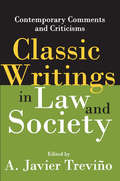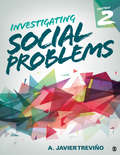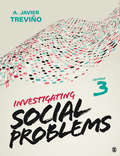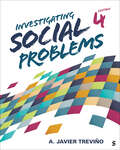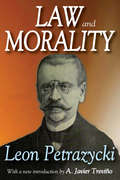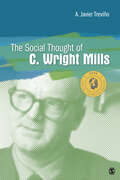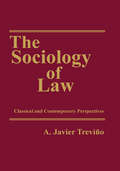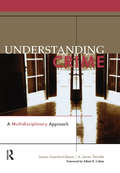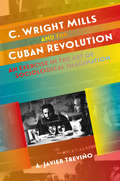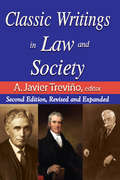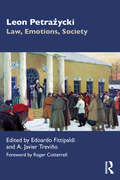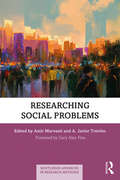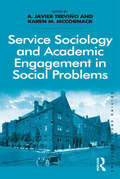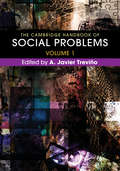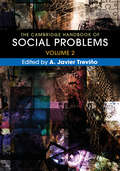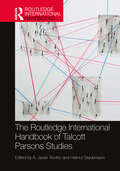- Table View
- List View
How Volatile and Unpredictable Are Aid Flows, and What Are the Policy Implications?
by A. Javier Hamann Aleš BulířA report from the International Monetary Fund.
Monetary and Exchange Rate Dynamics During Disinflation: An Empirical Analysis
by A. Javier Hamann Andrés Arias Lei ZhangA report from the International Monetary Fund.
The Reform of the Pension System in Italy
by A. Javier HamannA report from the International Monetary Fund.
Volatility of Development Aid: From the Frying Pan into the Fire?
by A. Javier Hamann Aleš BulířA report from the International Monetary Fund.
Why Do Many Disinflations Fail? The Importance of Luck, Timing, and Political Institutions
by Alessandro Prati A. Javier HamannA report from the International Monetary Fund.
Classic Writings in Law and Society: Contemporary Comments and Criticisms
by A. Javier TrevinoOver against such reference volumes as encyclopedias, which are intended to provide an overview and summary of a subject, and dictionaries, which define a series of terms, "commentaries" generally consist of a collection of lectures or essays that discuss and explain in some detail particular topics and sources. In law, the best known and oldest of these is William Blackstone's Commentaries on the Laws of England (1765-1769). Others, which are equally prominent, include James Kent's Commentaries on American Law (1826) and Joseph Story's Commentaries on the Constitution of the United States (1833). This volume is presented in the spirit of the aforementioned treatises. It consists of several essays of contemporary comments and criticisms intended generally to inform and educate.The commentaries in this book have two collective purposes. First and foremost, they are intended to acquaint a new generation of students with thirteen classic books written by diverse sociolegal scholars--ranging from Henry Sumner Maine, Oliver Wendell Holmes, Jr., and Hans Kelsen to Eugen Ehrlich, Nicholas S. Timasheff, and Richard Quinney. Second, they endeavor to demonstrate the contemporary theoretical relevance, the continuing legacy, of these classic writings. Accordingly, the commentaries discuss each of the scholars' work in general, how the particular book under consideration fits into that corpus, and how the book is assessed in a contemporary context. Singly and collectively these books have a clear relation to the "classic" tradition in thought--a tradition that, although not always acknowledged, is of great significance to current theorizing in law and society.The classic tradition represents those books that have come to be considered the foundational texts in the social scientific study of law. The commentaries collected here were written by some of today's leading scholars of law and society, including Piers Beirne, Dario Melossi, Kalus A. Zigert, Alan Hunt, Marshall B. Clinard, and Dragan Milovanovic.
Investigating Social Problems
by A. Javier TrevinoA. Javier Treviño, working with a panel of experts, thoroughly examines all aspects of social problems, providing a contemporary and authoritative introduction to the field. Each chapter is written by a specialist on that particular topic and the unique, contributed format ensures that the research and examples provided are the most current and relevant available. The text is framed around three major themes: intersectionality (the interplay of race, ethnicity, class, and gender), the global scope of many problems, and how researchers take an evidence-based approach to studying problems.
Investigating Social Problems
by A. Javier TrevinoA. Javier Treviño, working with a panel of experts, thoroughly examines all aspects of social problems, providing a contemporary and authoritative introduction to the field. Each chapter is written by a specialist on that particular topic and the unique, contributed format ensures that the research and examples provided are the most current and relevant available. The text is framed around three major themes: intersectionality (the interplay of race, ethnicity, class, and gender), the global scope of many problems, and how researchers take an evidence-based approach to studying problems.
Investigating Social Problems
by A. Javier TrevinoFor the Third Edition of Investigating Social Problems, editor A. Javier Treviño, has gathered a panel of top experts to thoroughly examine all aspects of social problems, providing students with a contemporary and authoritative introduction to the field. Each chapter is written by a well-known specialist on the topic being covered. This unique, contributed format ensures that the research and examples described are the most current and relevant available. In addition, the experts use both general theoretical approaches (structural functionalism, conflict theory, symbolic interactionism) as well as specialized theories chosen to bring additional insight and analysis to their assigned topics. The text is framed around three major themes: intersectionality (the interplay of race, ethnicity, class, and gender), the global scope of many problems, and how researchers take an evidence-based approach to studying problems. This title is accompanied by a complete teaching and learning package.
Investigating Social Problems
by A. Javier TrevinoFor the Third Edition of Investigating Social Problems, editor A. Javier Treviño, has gathered a panel of top experts to thoroughly examine all aspects of social problems, providing students with a contemporary and authoritative introduction to the field. Each chapter is written by a well-known specialist on the topic being covered. This unique, contributed format ensures that the research and examples described are the most current and relevant available. In addition, the experts use both general theoretical approaches (structural functionalism, conflict theory, symbolic interactionism) as well as specialized theories chosen to bring additional insight and analysis to their assigned topics. The text is framed around three major themes: intersectionality (the interplay of race, ethnicity, class, and gender), the global scope of many problems, and how researchers take an evidence-based approach to studying problems. This title is accompanied by a complete teaching and learning package.
Investigating Social Problems
by A. Javier TrevinoGeneral Editor A. Javier Trevino, working with a panel of experts, thoroughly examines all aspects of social problems, providing a contemporary and authoritative introduction to the field. Each chapter is written by a specialist on that particular topic. This unique, contributed format ensures that the research, examples, and theories described are the most current and relevant available. The text is framed around three major themes: intersectionality (the interplay of race, ethnicity, class, and gender), the global scope of many problems, and how researchers take an evidence-based approach to studying problems.
Investigating Social Problems
by A. Javier TrevinoGeneral Editor A. Javier Trevino, working with a panel of experts, thoroughly examines all aspects of social problems, providing a contemporary and authoritative introduction to the field. Each chapter is written by a specialist on that particular topic. This unique, contributed format ensures that the research, examples, and theories described are the most current and relevant available. The text is framed around three major themes: intersectionality (the interplay of race, ethnicity, class, and gender), the global scope of many problems, and how researchers take an evidence-based approach to studying problems.
Law and Morality: Leon Petrazycki (Twentieth Century Legal Philosophy Ser. #7)
by A. Javier Trevino Leon PetrazyckiIn analyzing the socio-psychic nature and operations of intuitive legal rules, Petrazycki formulates a theory of law around five conceptual themes: anti-formalism, imperative-attributive legal relationships, law's functional control, law's subjective reality and morality. Petrazycki presents the two ways by which law coordinates and regulates social conduct as through its distributive and organizing functions. Law and Morality has a basic objective: to analyze interrelations between positive and intuitive law. Petrazycki's socio-psychic orientation toward law is behavioral as well as thoughtful. He finds the most suitable methods for obtaining knowledge about legal experiences to be internal and external observation. His technique of introspection is similar to Max Weber's conceptual method. Petrazycki distinguishes between two kinds of interpretive understanding. External observation involves deriving the meaning of an act or symbolic expression from immediate observation without reference to any broader context, and internal observation involves placing the particular act in a broader context of meaning involving facts that cannot be derived from a particular act or expression. Petrazycki's socio-legal ideas remain relevant in today's society. His arguments concerning the global expansion of human love have an attraction for those working towards a better world. In the context of positive psychology and the growing happiness industry, Petrazycki's ideas will compel legal scholars to consider his arguments. Petrazycki's work stands out for the scientific ambitions and systematic nature of his thought as well as the influence of his work on later scholars in the sociology of law.
The Social Thought of C. Wright Mills (Social Thinkers Series)
by A. Javier TrevinoAn accessible introduction to the social and political thought of one of the leading critics of mid-twentieth century American societyThis inaugural volume of the Pine Forge Press Social Thinkers series provides a concise introduction to the work, life, and influences of C. Wright Mills. Accessible and provocative, this book closely examines the writings and ideas of C. Wright Mills that now, over half a century later, remain crucial in better understanding today′s world. The book′s primary focus is on two of his lifelong intellectual concerns: the interrelationship between social structure and personality and the bureaucratization of modern society and the power relations it produces. The book is ideal for use as a self-contained volume or in conjunction with sociological theory textbooks.
The Sociology of Law: Classical and Contemporary Perspectives
by A. Javier TrevinoThe purpose of this book is to introduce the sociology of law by providing a coherent organization to the general body of literature in that field. As such, the text gives a comprehensive overview of theoretical sociology of law. It deals with the broad expanse of the field and covers a vast amount of intellectual terrain. This volume is intended to fill a gap in the literature. Most textbooks in the sociology of law are insufficiently theoretical or else do not provide a paradigmatic analysis of sociological theories.The content of this text consists of discussions of the works of scholars who have contributed the most to the cumulative development of the sociology of law. It surveys the major traditions of legal sociology but is not wedded to any one particular theoretical approach. Both the "classical," or nineteenth-century, and "contemporary," or twentieth-century, perspectives are covered. The reader will see that nineteenth-century thought has directly influenced the emergence of twentieth-century theory.One unique feature of this book is that key sociological and legal concepts, presented in bold print and italics, are defined, described, and illustrated throughout. Although the nature of the subject matter is highly theoretical and, at times, quite complex, Trevino values every effort to present the material in the most straightforward and intelligible form possible without compromising the integrity of the theories themselves. In short, this book aims to accomplish three objectives: inform about the progressive advancement of sociological theory, teach the reader to analyze the law as a social phenomenon, and develop in the reader a critical mode of thinking about issues relevant to the relationship between law and society.
Understanding Crime: A Multidisciplinary Approach
by A. Javier Trevino Susan Guarino-GhezziExplores the interdisciplinary nature and potential of the field of criminology, covering the fields of sociology, economics, psychology, biology, philosophy and religious studies. The conclusion demonstrates various theoretical approaches for policy development and discusses opportunities for incorporating academic contributions into the political process.
C. Wright Mills and the Cuban Revolution: An Exercise in the Art of Sociological Imagination (Envisioning Cuba)
by A. Javier TreviñoIn C. Wright Mills and the Cuban Revolution, A. Javier Trevino reconsiders the opinions, perspectives, and insights of the Cubans that Mills interviewed during his visit to the island in 1960. On returning to the United States, the esteemed and controversial sociologist wrote a small paperback on much of what he had heard and seen, which he published as Listen, Yankee: The Revolution in Cuba. Those interviews--now transcribed and translated--are interwoven here with extensive annotations to explain and contextualize their content. Readers will be able to "hear" Mills as an expert interviewer and ascertain how he used what he learned from his informants. Trevino also recounts the experiences of four central figures whose lives became inextricably intertwined during that fateful summer of 1960: C. Wright Mills, Fidel Castro, Juan Arcocha, and Jean-Paul Sartre. The singular event that compelled their biographies to intersect at a decisive moment in the history of Cold War geopolitics--with its attendant animosities and intrigues--was the Cuban Revolution.
Classic Writings in Law and Society: Contemporary Comments and Criticisms
by A. Javier TreviñoThis volume consists of outstanding essays by contemporary scholars and specialists on classic writings in law and society. This second edition expands the previous volume by adding additional statements. Included are commentaries on Edward A. Ross's Social Control: A Survey of the Foundations of Order, Karl N. Llewellyn's Jurisprudence: Realism in Theory and Practice, Jerome Frank's Law and the Modern Mind, Leon Petrazycki's Law and Morality, and Karl Renner's The Institutions of Private Law and their Social Functions.The goal of Classic Writings in Law and Society is to acquaint a new generation of students with classic writings by diverse social and legal scholars ranging from Henry Sumner Maine, Oliver Wendell Holmes, Jr., and Hans Kelsen to Eugen Ehrlich, Nicholas S. Timasheff, and Richard Quinney. This work continues to demonstrate their contemporary theoretical relevance. Accordingly, each chapter speaks of the scholars' work in general, how the particular book under consideration fits into that corpus, and how the book is assessed in a present day context. These essays have a clear relation to the "classic" tradition in sociolegal thought.Reading the classics is useful in gaining a better understanding and appreciation of the essential foundation for a post-classic approach in law and social inquiry an approach that can be found in such orientations as critical legal studies, chaos theory in law, and legal semiotics. Classic Writings in Law and Society includes commentaries that consider early writings that set the standard for the social scientific approach in examining issues of law and punishment, social control, joint stock companies, business firms and nation-states in the study of law and society.
Clinard and Quinney's Criminal Behavior Systems: A Revised Edition
by A. Javier TreviñoAn important classic, familiar to virtually all criminologists, Clinard and Quinney’s Criminal Behavior Systems: A Revised Edition begins with a discussion of the construction of types of crime and then formulates and utilizes a useful typology of criminal behavior systems. It classifies crime into seven categories, among them: violent personal crime, occasional property crime, public order crime, occupational crime, corporate crime, organized crime, and political crime. They examine the criminal career of the offender in each category, public and legal attitudes toward these individuals, support systems they may have, attitudes of the offenders, and other features. The discussion of each category of crime is thorough and enlightening, and takes the reader far in understanding the huge problem of crime and establishing intelligent definitions to study it. The new edition looks at the criminal landscape of the twenty-first century, capturing both the numerous advancements in theory and research in the field of criminology, as well as many societal changes that have taken place in law, mass media, the economy, culture, and the political system that directly affect the book’s coverage of various types of crimes. A global perspective broadens the book’s relevance to include a variety of different societies. Crimes newly examined in this edition include identity theft, domestic violence, arson, hate crimes, cybercrime, campus sexual assault, police brutality, Ponzi schemes, human trafficking, and terrorism. Finally, alternatives to conventional criminal justice are considered, including such approaches as peacemaking, restorative justice, private justice, problem solving, harm reduction, naming and shaming, and internal and external controls. Like its predecessors, Clinard and Quinney’s Criminal Behavior Systems: A Revised Edition will be essential to criminologists formulating their own theories and research on criminal behavior as well as to students in criminology and sociology courses on how to view and study crime.
Leon Petrażycki: Law, Emotions, Society
by A. Javier Treviño Edoardo FittipaldiThe early 20th-century Russo-Polish legal thinker Leon Petrażycki (1867–1931) developed a comprehensive social psychology of law. Because only a fraction of his work is available in English, Petrażycki is today little known and seldom discussed in the Anglophone countries.This volume aims to remedy this deficit by introducing Petrażycki’s life and work specifically to an English-speaking audience. It is intended as a reappraisal of some of his views in the context of current advancements. This collection of 12 chapters produced by a panel of international scholars from various social science fields will be useful to a new generation of students formulating their own theories and research on socio-legal behavior.Leon Petrażycki: Law, Emotions, Society will be of interest to students and scholars of sociology of law, socio-legal studies, and philosophy of law
Researching Social Problems (Routledge Advances in Research Methods)
by Amir Marvasti A. Javier TreviñoThis book covers a wide range of contemporary methods for researching social problems and connects these approaches to the broader substance and theories of social problems. Expository and discursive in approach, chapters follow a uniform structure, with each offering research examples and a broad description of the related method and its theoretical context, together with a "how-to" guide for applying that method using substantive examples from the field of social problems. For every method explored, there is a research example that fully reviews and illustrates the application of the particular method, before giving a full assessment of the method’s strengths and weaknesses and latest developments. With chapters exploring survey interviews, in-depth interviews, narrative inquiry, institutional ethnography, participatory action research, auto-ethnography, Actor-Network Theory, experimental research, visual research methods, and research ethics, Researching Social Problems will appeal to scholars and students of sociology and politics working in the fields of research methods and social problems.
Service Sociology and Academic Engagement in Social Problems (Solving Social Problems)
by A. Javier Treviño Karen M. McCormackThis book challenges sociologists and sociology students to think beyond the construction of social problems to tackle a central question: What do sociologists do with the analytic tools and academic skills afforded by their discipline to respond to social problems? Service Sociology posits that a central role of sociology is not simply to analyse and interpret social problems, but to act in the world in an informed manner to ameliorate suffering and address the structural causes of these problems. This volume provides a unique contribution to this approach to sociology, exploring the intersection between its role as an academic discipline and its practice in the service of communities and people. With both contemporary and historical analyses, the book traces the legacy, characteristics, contours, and goals of the sociology of service, shedding light on its roots in early American sociology and its deep connections to activism, before examining the social context that underlies the call for volunteerism, community involvement and non-profit organisations, as well as the strategies that have promise in remedying contemporary social problems. Presenting examples of concrete social problems from around the world, including issues of democratic participation, poverty and unemployment, student involvement in microlending, disaster miitigation, the organization and leadership of social movements, homelessness, activism around HIV/AIDS and service spring breaks, Service Sociology and Academic Engagement in Social Problems explores the utility of public teaching, participatory action research, and service learning in the classroom as a contribution to the community.
The Cambridge Handbook of Social Problems, Volume 1
by A. Javier TreviñoThe introduction of the Affordable Care Act in the United States, the increasing use of prescription drugs, and the alleged abuse of racial profiling by police are just some of the factors contributing to twenty-first-century social problems. The Cambridge Handbook of Social Problems offers a wide-ranging roster of the social problems currently pressing for attention and amelioration. Unlike other works in this area, it also gives great consideration to theoretical and methodological discussions. The Handbook will benefit both undergraduate and graduate students eager to understand the sociology of social problems. It is suitable for classes in social problems, current events, and social theory. Featuring the most current research, the Handbook is an especially useful resource for sociologists and graduate students conducting research.
The Cambridge Handbook of Social Problems, Volume 2
by A. Javier TreviñoThe introduction of the Affordable Care Act in the United States, the increasing use of prescription drugs, and the alleged abuse of racial profiling by police are just some of the factors contributing to twenty-first-century social problems. The Cambridge Handbook of Social Problems offers a wide-ranging roster of the social problems currently pressing for attention and amelioration. Unlike other works in this area, it also gives great consideration to theoretical and methodological discussions. The Handbook will benefit both undergraduate and graduate students eager to understand the sociology of social problems. It is suitable for classes in social problems, current events, and social theory. Featuring the most current research, the Handbook is an especially useful resource for sociologists and graduate students conducting research.
The Routledge International Handbook of Talcott Parsons Studies (Routledge International Handbooks)
by A. Javier Treviño Helmut StaubmannTalcott Parsons was the leading theorist in American sociology—and perhaps in world sociology—from the 1940s to the 1970s. He created the dominant school of thought that made "Parsonian" a standard description of a theoretical attempt to unify social science, as reflected in the fact that his contributions to the discipline cover a range of issues, including medicine, the family, religion, law, the economy, race relations, and politics—to name but a few. This volume brings together leading scholars working in the field of "Parsonian Studies" to explore the background of Parsons’s work, the content of his oeuvre, and his subsequent influence. Thematically organized, it covers Parsons’s contributions and impacts in areas including the philosophy and methodology of the social sciences; cultural sociology; personality, mental illness, and psychoanalysis; and economics and political and economic sociology. In addition, it considers his influence in different areas of the world and on particular students, and offers insights into the Parsonian tradition’s practical application to contemporary social issues. An authoritative, comprehensive, and in-depth critical assessment of the Parsonian legacy, The Routledge International Handbook of Talcott Parsons Studies will appeal to scholars across the social sciences and in sociology and social theory in particular, with interests in the history of sociology and the enduring relevance of Talcott Parsons.

